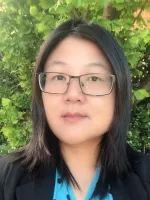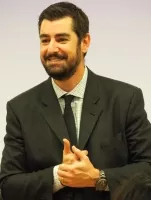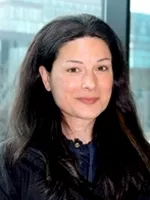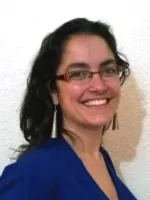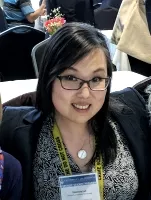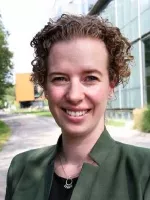I think of my teaching practice as collecting pebbles on the beach. My students and I are doing this together as a team: I may know the subject better but it's the exploration process that matters. And they need to be aware of the vastness of the subject. We will never be able to learn it all, but that's okay; we will make mistakes along the way, but that's okay: that's where growth happens. Once they have enough pebbles in their pockets, they can start making beautiful things using them.
- Xinli Wang, Sessional Lecturer, Department of Mathematical and Computational Sciences
As an educator, I believe that communication is the best way to build a link between my students and I. The tighter this link, the more it will enhance my teaching and, in turn, benefit my students. Therefore, I always cultivate communication when I begin a new class. I provide students multiple ways (raising hands, socrative surveys, emails etc.) of communicating with me whenever they have questions or on confused on a concept. I really value and reward those students who go beyond just facts and memorization, such as those who ask a probing or theoretical question about the subject matter.
- Yuhong He, Associate Professor, Department of Geography
Help your students to cultivate an enthusiastic and abiding curiosity in whatever they’re studying. Everything else should follow from this. Students who are curious about their world have more energy to ask questions, more patience to look for answers to these questions, and more incentive to communicate their findings clearly and persuasively.
- Mairi Cowan, Associate Professor, Teaching Stream & Program Director for History, Department of Historical Studies
It's all too easy to become cynical about student engagement and motivation. But if you find yourself feeling this way, resist the urge to blame your students and instead hang on to the idea that the time you have in class with students is precious! One of the best ways I've found to stay grounded and motivated is to connect with instructors who inspire me. Fortunately, this has been easy: we are surrounded at UTM by incredibly talented people who have thought deeply about their teaching, and care deeply about student learning. Reach out, go to a TLC workshop, and find out what is happening in classrooms around campus!
- Alex Rennet, Assistant Professor, Teaching Stream, Department of Mathematical and Computational Sciences
Back-and-forth conversation, even in the largest of lectures, can bring out new threads of inquiry that neither the students nor we would anticipate. This is perhaps the best part of teaching: conversation not only emphasizes the creative possibilities of historical scholarship, but reminds students and professors alike that as participants in writing and thinking about the world, we all share a stake in the work we do.
- Daniel Guadagnolo, Sessional Lecturer, Department of Historical Studies
Today’s students are facing unprecedented challenges for time management, as many activities are competing for their attention—schoolwork, afterschool jobs, social media, sports, etc. As a result, important but unurgent tasks such as completing weekly reading assignments and making weekly progress on term papers are constantly pushed down to the bottom of their routine to-do-list. One solution is to create an accountability system that assist students commit to weekly investment into each course. For example, requesting a weekly reading reflection in writing before class will ensure that students read and come prepared for class. Pre-class writing with a revised reflection writing after class would facilitate students to stay on track for important discussions during class meeting and give them an opportunity to correct errors and/or elaborate on ideas originally written in the reflection. The repetition also deepens their understanding of the course materials and enhances knowledge retention.
- Liye Xie, Assistant Professor, Department of Anthropology
I believe that education, at any level, is a complicated journey towards human emancipation. As a consequence, I try to think of my classes as a cool social laboratory where students can emulate future behaviours, learn from each others' mistakes, and play with different scenarios. I believe it's my role to intrigue our students and encourage them to create the useful, the beautiful, and the relevant. I've come to realize from my experience both in and out of the classroom, that this is how amazing things are done. With that mindset, I believe that we (teachers) should see student engagement as a symptom, not a target.”
-Rafael Chiuzi, Assistant Professor, Teaching Stream, Department of Management
Reach out. This can take many forms. Reach out to your students by using an anonymous questionnaire to get to know their learning preferences and adjust your teaching accordingly. Let your students know you are available to connect with them outside of class. Reach out to your colleagues for help when you need it and return the favour when your colleagues are struggling. Teaching is all about connections.
-Andie Burazin, Assistant Professor, Robert Gillespie Academic Skills Centre and Department of Mathematical and Computational Sciences
I find the key to a successful course, in my opinion, is helping students realize they have a huge amount of lived experience that is relevant to their work in my courses. If they are able to find ways to make the connections between their own lives and the concepts and theories I am teaching in human geography, not only do I feel that the course has been a success, I find that the students tend to take ownership of the learning process and make it their own. As an educator, that is extremely rewarding.
-Nicole Laliberte, Assistant Professor, Teaching Stream, Department of Geography
One of the enjoyments of teaching a second/foreign language, French in my case, is that it offers chances to integrate various types of learning experiences in the curriculum to empower students. Interesting and meaningful tasks that enable learners to directly apply their learning to authentic contexts produce more effective and longer lasting impacts. I love collaborating with students in order to learn about their interests, views, cultures, and concerns to create a more engaging learning experience. By doing so, I not only target more advanced language proficiency but more importantly, foster desire to know and learn more. It is extremely gratifying and fulfilling to hear from students who proudly share their real-life experience of connecting with others in the language that they learned with me.
-Rosa Hong, Assistant Professor, Teaching Stream, Department of Language Studies
Students in my courses explicitly discuss how course design, smart planning, and self-reflection can foster great study habits. In the first week, students design their own weekly work schedule according to when and where they study best, the rhythm of our course, and their other commitments. Students plan to complete several online low-stakes
activities during the week in order to consolidate new concepts, and we discuss and make plans for how to complete larger scaffolded assignments with firm deadlines. Periodic check-ins give students an opportunity to reflect on (and modify if necessary) their study routine, how they engage in reading and application, and how this all works with their schedules.
-Michelle Troberg, Assistant Professor, Teaching Stream
The word LISTEN contains the same letters as the word SILENT”. Effective teaching is not just about lecturing, but also listening – active listening. I actively listen to my students about their daily struggles and successes, listen to what they like and don’t like about their assignments and labs, listen about conflicts between colleagues. I listen for many reasons: how to improve my courses, how to maintain morale and respect within the classroom, but the biggest reason by far is I simply care. I care about their well-being and their outcomes in my course. I want all UofT grads to be able to achieve their best and be able to share that with the rest of the community. I love talking, but listening and being silent at times is certainly one the best skills I use to develop life-long relationships with my students.
-Vivienne Luk, Assistant Professor, Teaching Stream
Students thrive on opportunities. One of my principle goals is to encourage student engagement by involving students in the enterprise of university education. Whether through research opportunities I create to involve students in developing and executing projects, analysing data, and presenting findings, or through the teaching opportunities I develop to involve students in shaping university courses while training them to give their own lectures, providing students with opportunities to participate in knowledge production through research and teaching is both meaningful and rewarding. Students get to peak behind the curtain of university research and teaching while applying their knowledge and developing analytical and communication skills, self-confidence, and mastery over a subject. Providing students with opportunities to take a more active role in their learning stimulates their interest in the subject and encourages deeper learning.
-Nathan Innocente, Assistant Professor, Teaching Steam, Department of Sociology
Our task is “educere”: to educate, to bring out the best of every student, to act as a catalyst so that students can learn from one another, share their cultural background and their multilingual knowledge. Increased cultural and linguistic awareness broadens their minds and horizons, and enhances their personal and professional experiences. Our mission is to engage our students actively: we learn by doing and only acquired knowledge that is put into practice remains with us and is fully understood and appreciated.
-Michael Lettieri, Professor, Department of Language Studies, & Vice Dean Academic Experience
I want to inspire my students and to teach them how to think rather than what to think. To do this, I need to break down preconceived notions that students have about what it means to be a teacher and what it means to be a learner. One of the ways that I can do this is through active classroom discussions. Sharing viewpoints is valuable for our domestic and international students as well as for our English Language Learners (ELLs) because the topics raised provide insight into the unique community we have at UTM. Learning from a professor is important, but understanding the diverse perspectives of others is invaluable.
-Laura Taylor, Assistant Professor, Teaching Stream, and English as an Additional Language (EAL) Specialist, Robert Gillespie Academic Skills Centre
My passion and enthusiasm for my discipline is informed by years of research and teaching. With this in mind, I try to stimulate intellectual curiosity via student involvement in their learning, primarily through the integration of active learning opportunities. In an active learning environment, students are exploring materials, generating questions, and having teaching experiences designed to elucidate abstract theories and concepts. And, where possible, I involve students in the research process so that they can see how knowledge is produced; in my experience, this really enriches students’ understanding of research and the discipline. I am also not shy about demonstrating my enthusiasm for the subject matter, mostly in class time; importantly, my students tell me that my enthusiasm is contagious and enriches their overall learning experience and produces engagement.
-Jayne Baker, Assistant Professor, Teaching Stream, Department of Sociology
If I could change just one thing about how we teach and assess writing, it would be to stop thinking about commentary on student work as 'feedback,' and instead thinking about it as 'feedforward.
-Michael Kaler, Assistant Professor, Teaching Stream, and Writing Specialist, Robert Gillespie Academic Skills Centre
I use a lot of “it’s okay…even great…to fail” examples in class. I try to model to my students how you can actually learn more from failing than from succeeding…science is full of these narratives, and I try to weave them into lecture. Things like the discovery of penicillin, development of anesthesia, the invention of the pacemaker, or the invention of the slinky – these things were actually “mistakes” or “accidents”. On a personal note, I’m fairly open about the mistakes I have made – I want students to know that it is okay to make mistakes, and that there shouldn’t be any stigma to failure.
-Fiona Rawle, Associate Professor, Teaching Stream, Department of Biology, & Associate Dean, Undergraduate

